8 September 2023
For the 2023–2024 academic year, we offer 16 online short courses covering legal issues and topics relevant to armed conflicts.
Ranging from introductory courses to international law, international humanitarian law (IHL), international human rights law (IHRL) and international criminal law (ICL), they also address topical questions like counterterrorism, sanctions, the responsibility to protect or accountability for international crimes.
Two courses also delve into the practical application of IHL and IHRL, shedding light on the real-world challenges associated with their implementation and offering valuable perspectives on the practical implications of these legal frameworks.
‘As armed conflicts continue to evolve in complexity, it has become increasingly crucial for professionals operating within these environments to master the legal frameworks governing such situations. This expertise is essential for effectively navigating and mitigating the myriad challenges that inevitably surface in these dynamic contexts explains our Head of Education Dr Clotilde Pégorier.









